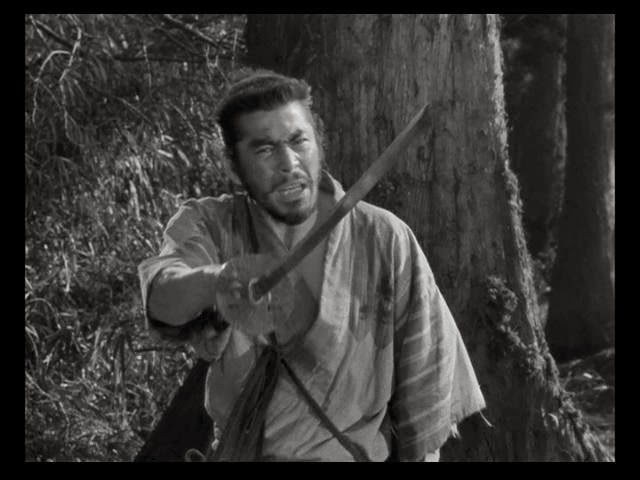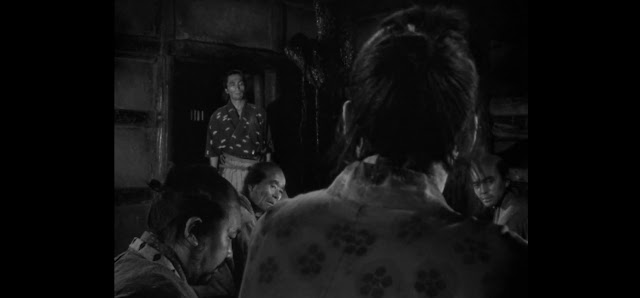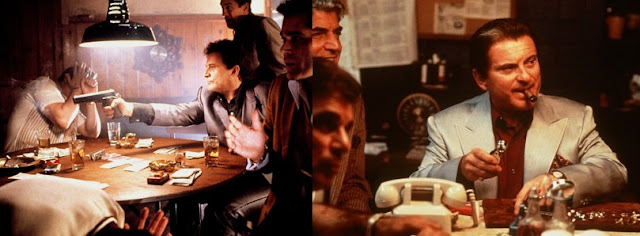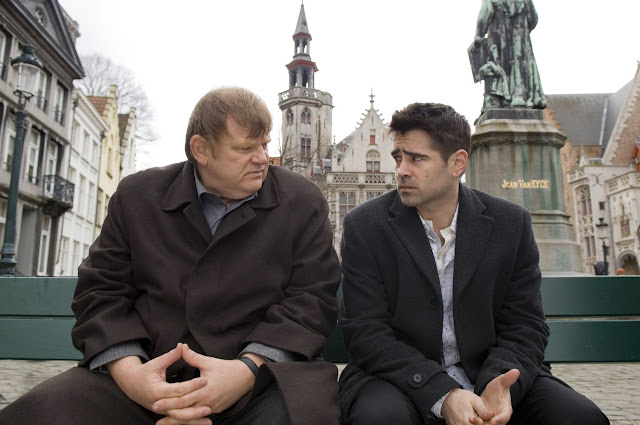The hidden gems of Seven Samurai: Kyuzo
 |
| Who are you calling a triangle?! |
Black and white. Check. Samurai. Double Check. Classic cinema. Check, check, check. Akira Kurosawa. Initiate screaming. Seven Samurai. Stop. Reeelax.
Young, aspiring directors get a mandatory face-off with the master Akira Kurosawa - whether they want it or not - the very first few weeks they set foot on campus. And they should. I mean, how else can you learn the basics of camera angles, storytelling through moving pictures, and turning a great script into an unextinguishable flame of classic cinema? Speaking of inextinguishable flames, I bet there are things you don't know about Seven Samurai. Hidden in those three and half hours of quiet brilliance are devices that contribute to the story and deepen the characters. And I'll get to them whether you want it or not, triangle!
Well, opening scenes matter. But the ones that matter are not always placed at the start.
This is the case with Kyuzo - the masterful swordsman of the seven-strong bunch. When we are first introduced to Kyuzo, we see him shaving twigs off a branch, to turn it into a stick to use as a practicing sword against a challenger. This is not insignificant and its significance is revealed at the end of the movie, but there are a few steps before that.
When Kambei and young Katsushiro approach Kyuzo to ask him to join their group, Kyuzo rejects them. He has his reasons - after all, a warrior never sleeps. A warrior controls his environment. A warrior walks in when he wants to walk in and when others least expect him. But watch the scene carefully when Kyuzo walks into the primitive hostel. He walks in quietly, just as Kambei is lecturing young Katsushiro about life:
"Hone your skills, then go to war, and do great things. Then become a lord of your own castle and domain. But as you dream those dreams, before you know it, your hair will turn gray as mine. By that time, you've lost your parents, and you are alone."
Kyuzo recognizes himself in this story. He's also chasing dreams. The dream to be the perfect swordsman - an unattainable dream. A path that has no end, a path few dare to walk, and even fewer endure. And he kept on walking until there was nothing left but the frosty bite of loneliness. Just like Buddha, who climbed the mountain peak and reached a point beyond which there is not a single living soul. So he turned back. To rejoin humanity. Just as Kyuzo desires.
Look carefully at the shot with Kyuzo when others acknowledge his presence. Notice the lighting on his face and what's behind him. In the corner, a big, black piece of wood looks like a menacing demon, floating off the ground, Kyuzo's shadow blends with it, as if staring straight at him, and his face, pale as that of a dying man - a premonition of his death. Or maybe, a premonition of the shattering of his dream. But what happens if a man has poured all his life force into a single dream. Does he die along with his dream too?
Kyuzo doesn't yet know his fate, of course. But what he knows is his loneliness. The product of a lifelong polishing of his swordsmanship skills. A life of willfully battering the ego because it's the last obstacle to perfection; because it's a double-edged sword in the midst of battle. Kyuzo will die, for doing the right thing for his soul. Yet, it is how he dies that makes it even more tragic.
Remember the stick? The one Kyuzo took the twigs off to fight with the challenger? That's the other sign. First, we find out the 'how', and only later do we find out 'the how of what'. And that's Kurasawa at his best.
The stick is the gun he gets killed with. He got shot by a primitive model of a carabine - a stick with modifications. One that takes a minute for the rope to burn and to bring the cock down to initiate a shot.
The stick he used as a substitute for his deadlier katana has transformed into an even deadlier weapon. The greatest swordsman did not even manage to draw his katana out. That's how much more powerful the new weapon is.
How ironic it is for the greatest swordsman to die from a shot in the back by a cowardly thief chieftain that has not even got 1/50 of Kyuzo's skills.
 |
| Boom. Let's get back to drinking. |
It's how Kurosawa tells us 'It's the end of the era of man'. Man has begun to fade into the background. Man's creations have begun to overshadow him, just like the black demon - a long process that continues today. It begs the question: 'What's the value of man?'.
And I started on a positive note...What triangle I am...
More on Kurosawa (quality appreciated):




Comments
Post a Comment